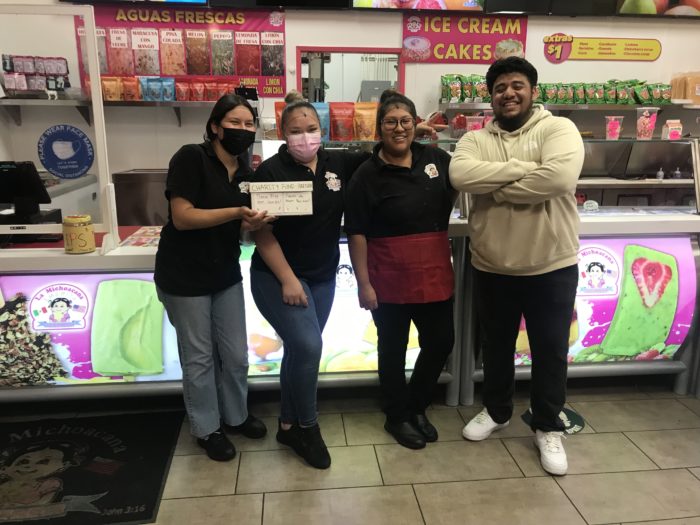Marketing Student Issac Morales Works with Local Business to Raise Money for Woodbury’s Food for Thought Campaign
When School of Business Marketing student Issac Morales was assigned a civic engagement project for his Business Ethics (MGMT 350) course with Dr. Svetlana Holt, he knew he wanted to give back to the community. “I had in mind volunteering at a food bank,” Issac says. The Business Ethics civic engagement project, which is one of a number of civic engagement projects the School of Business requires its students to engage in during their time at Woodbury, focuses on finding a real-life problem related to moral responsibility and taking on a leadership role to alleviate the problem. As the course progressed, Issac began to give more thought to the way he wanted to give back.
 “Throughout the following weeks [of] our Business Ethics course,” Issac says, “I was inspired and influenced by Dr. Holt’s lectures and assignments [as well as] by the Financial Sustainability Program, which essentially lead [me] to having a different approach towards…contributing and giving back effectively.” As a financial coach in Woodbury’s Financial Sustainability program, Issac was working on a budgeting presentation with Esteban Blas, Financial Advisor, and Edward Rivas, Interim Assistant Vice President of Academic Affairs, when they came across the “Hungry and Homeless” report in iGrad.
“Throughout the following weeks [of] our Business Ethics course,” Issac says, “I was inspired and influenced by Dr. Holt’s lectures and assignments [as well as] by the Financial Sustainability Program, which essentially lead [me] to having a different approach towards…contributing and giving back effectively.” As a financial coach in Woodbury’s Financial Sustainability program, Issac was working on a budgeting presentation with Esteban Blas, Financial Advisor, and Edward Rivas, Interim Assistant Vice President of Academic Affairs, when they came across the “Hungry and Homeless” report in iGrad.
The report showed “that 20% of students have food insecurity, are unable to purchase nutrition, and go to bed with the feeling of hunger,” Issac says, “this was essentially what shifted my focus onto trying to help individuals at the college level.” After finding this research, Issac made the decision to focus his project on helping college students that are dealing with food insecurity. As a college student, Issac understood the normal stresses that students face daily but realized that some students may be dealing with additional stress brought on by food insecurity and wanted to find a way to help alleviate that stress.
Once Issac had decided what real-life problem he wanted to solve, he needed to develop a plan of action. “I decided to try and conduct a fundraiser, so I went to La Michoacana Ice Cream Parlor Emerita because of their history in hosting fundraisers to help their community,” Issac says. Issac goes on to say, “I met with the shop owner Emerita Jiménez and, after [sharing] the issue of food insecurity within [the college student population], she did not hesitate to allow a fundraiser which allowed 15% [of] all sales throughout a six-hour period to be donated towards our cause.” Issac was given the choice of which ice cream parlor he could host the fundraiser at, and he ultimately chose the location he believed would have the highest customer traffic.
During the fundraiser, Issac was able to interact with customers and bring awareness to food insecurity among college students. While speaking with customers, Issac recalls that many people were not familiar with the number of college students who were facing food insecurity. However, after Issac provided them with more information, those he spoke to were supportive and several indicated that they were going to take further steps on their own to learn more.
Through the fundraiser, Issac was able to raise $250. After speaking with Edward and Esteban, Issac met with Associate Dean of Students Shannon Savage to discuss donating the money to Woodbury’s Food for Thought Program. The Food for Thought program helps students who are struggling with food insecurity by providing students with as many as five free meals per week at a nearby eatery. Issac chose to donate the money from the fundraiser to the Food for Thought campaign to help fellow students feel “a sense of relief [to not have to] worry about food.”
Moving forward, Issac hopes to be able to continue to give back. A Marketing student, Issac hopes to enter the food industry. His goal is to one day open a restaurant that never turns customers away for not being able to pay and gives a percentage of the revenue to organizations that help students fulfill their educational goals and reduce food insecurity-related dropouts. As Dr. Holt says, “Watch this space! This is only a beginning…and makes me hopeful for our future.”
If you would like to donate to our Food for Thought program, please click here. If you’re a student who is food insecure, you can apply for the program here.
Last updated on December 8, 2022.